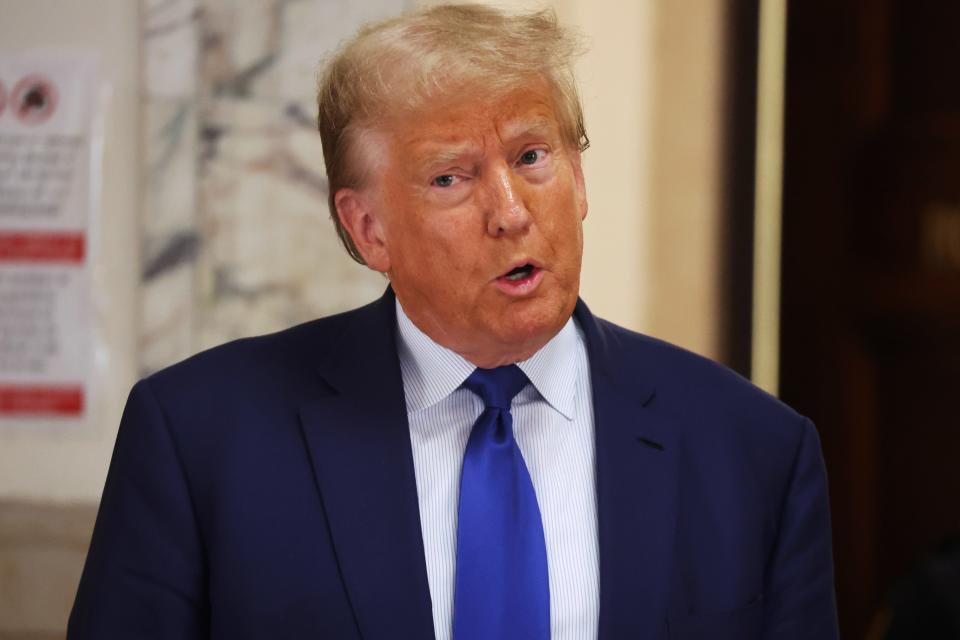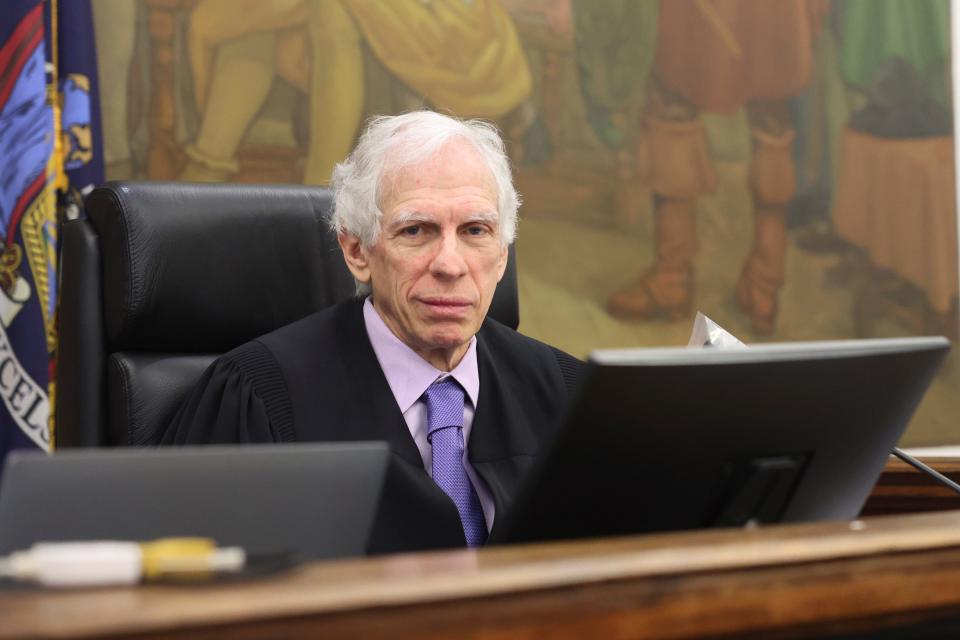Donald Trump must post a bond for full $454 million fraud judgment during appeal: judge
- Oops!Something went wrong.Please try again later.
- Oops!Something went wrong.Please try again later.
- Oops!Something went wrong.Please try again later.
A New York appellate judge rejected an emergency request Wednesday from Donald Trump to post a $100 million bond while appealing what he called an “exorbitant and punitive” $454 million fraud judgment against him.
State Attorney General Letitia James opposed Trump's request and asked for the former president to have to post the entire judgment, to ensure the state would be paid if he loses his appeal.
Judge Anil Singh of the state court’s Appellate Division ruled Trump has to post a bond for the entire judgment and that his three-year prohibition against running a corporation in New York would remain in force. However, he did allow Trump's two adult sons to run the Trump Organization while the appeal is considered, despite the trial imposing a similar prohibition on Eric Trump and Donald Trump, Jr. The business prohibition also bars him from getting loans from financial institutions chartered or registered in the state.
Singh's temporary ruling now heads to a five-judge appellate panel to determine how much Trump must post to avoid paying the full judgment while he appeals.
Singh set a deadline of March 11 for the attorney general's office to file a written argument against Trump's request for a lower bond. Trump will then have until March 18 to respond.
The clock is ticking on the appeals panel. The $454 million judgment against Trump comes due 30 days after the judgment was finalized on Feb. 23.

What is behind the $454 million judgment against Trump?
Trump is appealing state Judge Arthur Engoron’s ruling that ordered the former president and his namesake company to pay the government for ill-gotten gains from overstating the value of his real-estate. The verdict also barred Trump from doing business in New York for three years, which includes borrowing from New York-based banks.
While Trump appeals the judgment, he asked to postpone paying the full amount because he would have trouble raising the cash.
“The exorbitant and punitive amount of the Judgment coupled with an unlawful and unconstitutional blanket prohibition on lending transactions would make it impossible to secure and post a complete bond,” Trump’s lawyers Clifford Robert and Alina Habba wrote.
But James opposed the request by arguing Trump is unlikely to prevail in his appeal. She argued a full bond is required precisely because of his insufficient cash and need to raise further capital.
“There is no merit to defendants’ contention that a full bond or deposit is unnecessary because they are willing to post a partial undertaking of less than a quarter of the judgment amount,” James wrote. “Defendants all but concede that Mr. Trump has insufficient liquid assets to satisfy the judgment; defendants would need ‘to raise capital’ to do so.”
James argued that Engoron's prohibition against future loans is warranted because the heart of the case dealt with Trump’s fraudulent and misleading statements to financial institutions.
“These are precisely the circumstances for which a full bond or deposit is necessary, where defendants’ approach would leave OAG with substantial shortfalls once this Court affirms the judgment,” James wrote.

Five-judge state appeals panel will review Trump's bond request
Because Trump asked for an expedited decision, Judge Singh held a hearing Wednesday based on written arguments from lawyer for Trump and the attorney general's office.
Trump's request will now be passed to five-judge appellate panel to determine what level to set the appeal bond, according to Mark Zauderer, a senior partner at Dorf Nelson & Zauderer who has practiced in the court for decades.
The panel will review the written arguments from Trump and James and typically reach a decision within several weeks, Zauderer said.
The appellate panel could set a bond anywhere from zero to the full judgment. Because interest continues to accrue on the judgment at 9% per year, a bond could be set higher than $454 million to anticipate the interest while the case is argued, Zauderer said.

A fraud that 'shock(s) the conscience'
In his judgment, Engoron wrote that the frauds uncovered in the investigation, such as Trump massively overvaluing his assets to secure better loan terms, "leap off the page and shock the conscience."
An independent monitor Engoron assigned to oversee Trump’s business while the case was argued and for the next three years found that Trump “surreptitiously transferred $40 million from their accounts without disclosing the transfer,” according to James. Trump also sought to move portions of the Trump Organization operating in New York to Florida.
“Contrary to defendants’ argument there is substantial risk that defendants will attempt to evade enforcement of the judgment (or make enforcement more difficult) following appeal,” James wrote.
In addition to an $83.3 million loss in court last month to writer E. Jean Carroll in a New York defamation case, the verdict in Trump's civil fraud trial has created a cash crunch for the real estate mogul, who now owes more than half a billion dollars.
Trump argued that the "unprecedented $464 million fine" against him, his two older sons and a former corporate executive was unconstitutional because it resulted from a lawsuit that unfairly targeted him.
Trump argued James went after him without showing he had harmed any victims, and that her public statements demonstrated she considers him a political danger and was targeting him.
James documented at trial that Trump routinely overstated the value of properties by exaggerating their square footage or overestimating the revenue that could be generated from rents.
“Their complete lack of contrition and remorse borders on pathological,” Engoron wrote.
This article originally appeared on USA TODAY: Trump must post $454 million in appealing New York fraud judgment

